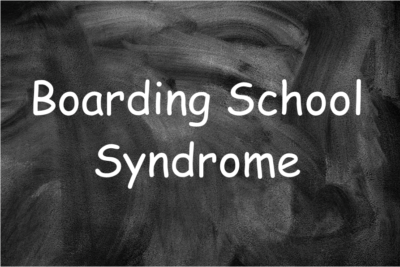COUNSELLING FOR EX-BOARDERS and BOARDING SCHOOL SYNDROME
"I didn't realise how much it had affected me"
What is Boarding School Syndrome?
Many boarders retain positive and happy memories of their time at boarding school. For others, it was a time of struggle and a deeply unpleasant experience. Whatever your memories of boarding, all boarders had to find a way to negotiate the experience. Some are able to achieve this more successfully than others.
Being separated from your family at a key time in your early emotional development requires you to develop a “strategic survival personality” – a way of adapting to your new surroundings in order to survive the experience. The long-term consequence of this strategy can leave emotional scars which might limit the adult boarder from living their life to the full, or negatively impact how you engage in, and conduct, relationships with others.

What are the symptoms of Boarding School Syndrome?
Some clients can identify deeply unpleasant experiences at boarding school, such as abuse or bullying, and want to work through how these incidents are affecting their present-day life. However, the majority of clients that present for therapy, display symptoms where the link between their time at boarding school, and their current behaviours are less obvious. Examples of some of these symptoms and behaviours are:
- Fear of being abandoned, or struggling with endings.
- Feeling unlovable, alone or a failure.
- Discomfort with emotional intimacy or commitment.
- Having relationship problems with your partner, children or parents.
- Struggling to control emotions.
- Sensitivity to being touched, and fear with offering touch to others.
- Having a difficult relationship with authority.
- Avoiding conflict.
- Preferring to work for organisations where a clear structure exists.
- Fear of breaking rules, and showing anger towards others that do.
- Scared of getting “found out” or caught, even when there is nothing to hide.
- Feeling that you are a fraud or impostor.
- Scared of going to or staying in bed at night.
- Flashbacks to experiences at school.
Boarding School Syndrome is not a medical condition in the true sense. It is a cluster of learned behaviours developed during your time at boarding school, which now manifest in adult life and negatively impact it. It is often difficult to consider and accept that long-term exposure to a life hidden in privilege can lead to difficulties in adult life. Many therapists, myself included, consider that the impact of a boarding experience can result in “developmental trauma” caused by the separation of the child from their primary caregiving family.
How does therapy help
Talking to me about your boarding school experiences, examining and processing how you feel about it as an adult, can be immensely helpful. I provide space for you to explore your emotions about what it was like to live in an “institution” where you were separated from your family and cared for by strangers.
An important step is to recognise the effects of how you learned to “be” as a child whilst boarding. This involves the sometimes painful acknowledgement and acceptance of the strategies you developed to survive, and recognition of how those strategies affect key aspects of your personality in adult life. You might have learned to become invisible to avoid bullying, or you may have become a bully to appear strong. Some children use humour or become overgenerous to gain acceptance, whilst others excelled at sports to gain approval.
In your current life, there may be numerous ways in which you are not functioning well; perhaps in managing relationships, problems of a practical nature, or in failing to fulfil your potential. Therapy allows you to explore all of these issues, with reference back to how you were impacted by your boarding experience.
The healing process then moves on from surviving to living. Re-learning ways to live a normal rewarding life, and developing healthier behaviour patterns.
